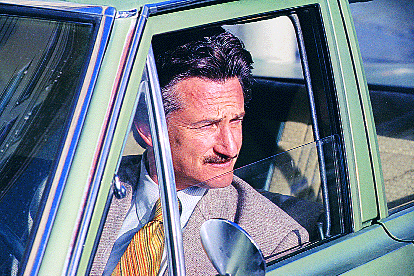Sean Penn plays an alienated citizen eager to murder to gain some respect
Exactly 30 years ago, Samuel Byck, a misguided malcontent dressed as Santa Claus, picketed the White House lawn and protested the scabrous policies of the Nixon administration. But Byck didn’t stop there.
Blaming the president for his own business and romantic failures, as well as pretty much all the nation’s ills, Byck attempted, in an act of crazed desperation, to hijack a plane and crash it into the White House. He longed to kill Nixon and finally make a mark on history.
Byck botched that endeavor miserably, too.
Fascinated with the story, first-time filmmaker Niels Mueller directed “The Assassination of Richard Nixon,” starring Sean Penn in top form as the volatile Byck. Aside from minor plot retooling, Mueller and co-writer Kevin Kennedy have stuck to the facts as much as possible.
The result is an intermittently absorbing yet ultimately claustrophobic, dour affair.
Sam Bicke—Mueller’s lawyers advised a tweak in the spelling—is a 44-year-old loser who likens himself to a “grain of sand on this beach called America.” He can’t seem to keep a job or a woman. He stinks as an office furniture salesman because hype runs counter to his rigid principles. His hard-ass, sleazeball boss—Jack Thompson, who gives a dead-on, chilling performance—is not pleased.
At first, Bicke does his best to turn his life around. Along with his reluctant partner, Bonny (Don Cheadle), he applies for a government loan to get a ludicrous business scheme—a traveling tire store on wheels—up and running. He recites aphorisms from “How to Win Friends and Influence People” by Dale Carnegie, albeit with hollow conviction.
Frantic to regain a meaningful human connection, Bicke tries to woo back his estranged wife, Marie (Naomi Watts), but she pities him more than she loves him. The marriage is over, yet he refuses to remove his wedding ring.
Perhaps assuming his audience is as daft as his subject, Mueller adds scenes to drive home Bicke’s nebbish ineptitude. Bicke screws up taking a family photo that only he wants. At the furniture store, when the secretary squawks orders, he jumps. Mueller means for these moments to be painful for Bicke, but they also register as painfully facile.
Refusing to accept responsibility, the desperado devises an assassination plot dubbed “Operation Pandora’s Box” to exact revenge. Pres. Nixon, a ubiquitous TV presence, awash in the Vietnam quagmire and later the Watergate scandal, is the ideal target.
“The whole system has a cancer, but somebody has to resist,” Bicke laments. He embraces the Black Panthers’ motto, “By any means necessary.”
For posterity, Bicke documents his plan, and his pain, on a series of reel-to-reel tapes, preparing to send them to, among others, maestro Leonard Bernstein, whom he views as the embodiment of goodness.
“All I want is a piece of the American Dream,” whines Bicke. Dictating into the machine, he is so articulate, so insightful, we wonder why he doesn’t try his hand at, say, becoming an op-ed columnist—or a screenwriter.
All too predictably, Bicke descends into madness. With each visit to the mailbox, seeking approval on his government loan application, he appears increasingly disheveled, in the end wearing rumpled boxer shorts and a scraggly beard.
With its clunky, shaky-camera technique, “The Assassination of Richard Nixon” may be as misguided as one of Bicke’s schemes, and sitting through the film can be an exercise in frustration. Watching Bicke mope and stammer as a sort of “Willy Loman with a vengeance,” you just want to shake some sense into him.
Mueller claims he wanted to explore “how a person goes from point A to B, with point B being when this person loses all empathy for those around him and lashes out in indiscriminate violence.” But the film also asks us to empathize with a deranged terrorist. No thanks.
Without Penn, who nabbed last year’s Oscar for Best Actor for his performance in “Mystic River” and who turns in another lean, incisive turn as the brow-beaten Bicke, the film would surely sink.
Although Samuel Byck is barely a footnote in history, Mario Cantone played him in the Broadway revival of Stephen Sondheim’s “Assassins.”
Byck’s glib explanation for planning the attack was, “Because there isn’t any Santa Claus.” Pity that no one—his boss, his wife, or even Dale Carnegie—bothered to advise him that once you stop believing, you’re doomed.

































